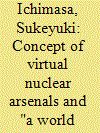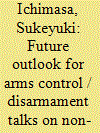|
|
|
Sort Order |
|
|
|
Items / Page
|
|
|
|
|
|
|
| Srl | Item |
| 1 |
ID:
122600


|
|
|
|
|
| Publication |
2012.
|
| Summary/Abstract |
Proposed by J. Schell and others in the Cold War era, the concept of virtual nuclear arsenals has been
a subject of debate. From the standpoint of the theory of nuclear disarmament, the concept has been
questioned on the basis of justifying the nuclear threat, infringing on the irreversibility requirement of
disarmament, and fixating the discriminatory structure of nuclear weapons. On the other hand, from
the viewpoint of the theory of nuclear deterrence, the problem of instability and feasibility inherent in
the concept and the idea of reconstructing nuclear arsenals that will decrease second strike capability
have been under harsh criticisms. Attempting to find new inter-linkages between the debates of
nuclear disarmament and deterrence theories over the vision of "a world without nuclear weapons"
proposed by the US Obama administration, this study sets out to examine the implications that the
concept of virtual nuclear arsenals may have on the current international security environment from
the two aspects of: nuclear deterrence and disarmament; and nuclear non-proliferation.
|
|
|
|
|
|
|
|
|
|
|
|
|
|
|
|
| 2 |
ID:
128978


|
|
|
|
|
| Publication |
2013.
|
| Summary/Abstract |
Following the ratification of the New Strategic Arms Reduction Treaty (New START), the U.S.
Obama administration has shown enthusiasm towards the inclusion of non-strategic nuclear
forces - arsenals that were unaddressed in past nuclear arms control treaties between the two
countries - into the agenda of talks with Russia. However, non-strategic nuclear forces have
played different roles in each country, militarily and politically. For the U.S., the military value
of non-strategic nuclear forces has been declining. Their significance is becoming increasingly
difficult to discern, except for demonstrating commitment to visible extended deterrence to U.S.
allies. NATO, on the other hand, has stated in the 2012 Deterrence and Defense Posture Review
that it would explore reciprocal reductions of non-strategic nuclear forces with Russia, and as a
nuclear alliance, reaffirmed the deterrent role of non-strategic nuclear forces. By contrast, Russia
continues to attach importance to the role of non-strategic nuclear forces as an important element
of deterrence, and has expressed growing wariness over the development of U.S.'s ballistic missile
defense systems and conventional prompt global strike (CPGS) capability. The outlook for U.S.-
Russian arms control and disarmament of non-strategic nuclear forces is by no means promising.
Accordingly, it is imperative that U.S., Russia, and NATO continue to hold strategic dialogues
and build trust if reductions of non-strategic nuclear forces are to take place. The U.S. initiative
to reduce nuclear forces is particularly key. Critical tasks ahead will be the development of a new
common understanding between the U.S. and its allies regarding strategic stability and the role of
nuclear forces in deterrence, in addition to a shared understanding on the qualitative changes of the
threats facing the U.S. and Russia, respectively.
|
|
|
|
|
|
|
|
|
|
|
|
|
|
|
|
|
|
|
|
|